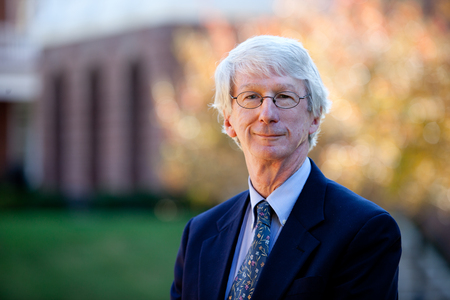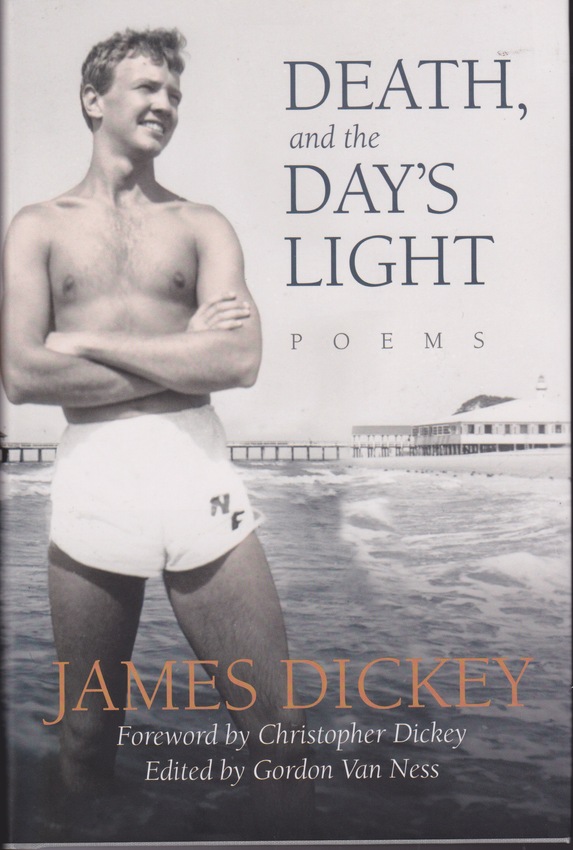Few scholars are as familiar with James Dickey’s literary work as Dr. Gordon Van Ness, but even he was intimidated by his latest project.
The Longwood University English professor, already the author of four books on Dickey, edited two long poems that were unfinished at the time of Dickey’s death. "Show Us the Sea" and"For Jules Bacon" are featured in a recently published book of his poetry, Death, and the Day’s Light, edited by Van Ness.
"Several times, I wanted to walk away from the project," Van Ness said of his work in editing the poems, which took three years.
"Even though I knew Dickey the poet and Dickey the man, I felt inadequate to do this, but I saw how it might be possible," said Van Ness. "I would describe it as a work-in-progress, a polished rough draft, which I brought closer to completion."
Dickey (1923-97) was a poet, novelist and essayist who is best known for his novel Deliverance. Van Ness’ relationship with Dickey was both professional—his scholarship includes the two-volume collection The OneVoice of James Dickey: His Letters and Life, 1942-1997—as well as personal.
"In many ways, he was like a second father to me. I miss Dickey every day," said Van Ness. "We were close. He once said to me, ‘You’re part of the legacy.’"
"Show Us the Sea" and "For Jules Bacon" are accompanied in the new book by three other poems Dickey wrote late in life—published previously but never in a collection—along with two poems that Dickey called "out-takes" of "Show Us the Sea". In 1996, knowing that he was dying of fibrosis of the lungs, Dickey tried to finish the pair of long poems, which comprised what he called "Two Poems on the Survival of the Male Body."
A few months before Dickey died, he told his son, Christopher, that he had "worked on these poems for years, and that he thought they were the most important poems he had ever written," the younger Dickey wrote in his foreword to Death, and the Day’s Light, published by Mercer University Press in April.
"These two long poems constitute a return to his early poems, revealing not the drunken genius but the football player and weight lifter, the combat aviator and caring father," said Van Ness. "They show Dickey’s quiet acceptance of death, less a surrender than a separate peace.
"When I read these two poems, I get that hit-in-the-gut feeling. Some of these lines are incredibly moving, and there are moments of sparkling intensity. Dickey is accepting the cyclical unity of life. He is finding his own self, reconnecting with family, mending fences, coming full circle."
Van Ness described "Show Us the Sea" as "a meditation on fathers and sons, youth and old age, and death and immortality." "For Jules Bacon," dedicated to Mr. America 1943, centers on "survival during warfare" and evolved from Dickey’s efforts as a World War II aviator in the Pacific to "improve his physique by lifting weights fashioned from discarded war materiel," he said.
In May 2009, Van Ness wrote to Christopher Dickey, one of three members of the writer’s estate, and proposed to edit the two poems. Van Ness didn’t know then that Dickey had been asked by his father, shortly before he died, to finish the poems after his death. Dickey, who tried but was unable to do so, approved Van Ness’ proposal—which he called "intriguing"—after checking with the other members of the estate.
"Throughout this process, the governing principle was ‘Less Van Ness, more Dickey,’" said Van Ness. "The problem, though, was: What is Dickey? I had never edited unfinished poems, which made me cautious—maybe too cautious. Plenty of people said I shouldn’t do this."
"Show Us The Sea" had 15 identifiable typescript drafts, "For Jules Bacon" eight drafts. "Dickey was a prolific reviser," said Van Ness, who saw a draft of the latter poem when he visited Dickey at his home in Columbia, S.C., in 1994, during which Dickey read aloud the poem’s conclusion.

Would Dickey be pleased with Van Ness’ editing? "I wish I knew. I hope so. I feel I have done as good a job as anybody could have done. All three members of his estate are excited with the results."
In the book’s foreword, Van Ness’ work is praised by Christopher Dickey, The Daily Beast’s foreign editor. "What Gordon has done with those two poems is truly remarkable: he has found the voice of James Dickey; he has resurrected the genius," wrote Dickey, who called Van Ness "one of the best, most conscientious scholars to have studied my father's work."
Dickey’s estate also has granted Van Ness permission to edit the final poem on which Dickey was working, "Eden, " about a poet dying from Parkinson’s. He’s "about one-third" of the way through and expects to finish by spring 2016 at the latest. Van Ness also has been given permission by the estate to write a biography, tentatively titled James Dickey: A Literary Life, which will focus on "how his life affected his writings."
Van Ness’ life has been affected, and enriched, by his relationship with the man he called "Jim," who always addressed him as "Van." Their friendship began when, as a master’s degree student in 1982 at the University of Richmond, Van Ness wrote to the writer, whose long poem The Zodiac he had chosen as the topic of his thesis. Dickey, a longtime English professor and poet-in-residence at the University of South Carolina (USC), immediately agreed to Van Ness’ request for a phone interview and over the course of their friendship showed him numerous kindnesses.
"When I first wrote to him, he sent me an inscribed, limited-edition boxed copy of The Zodiac," said Van Ness. "When I was working on my Ph.D. [at USC, where he took courses under Dickey], he gave me access to his war correspondence, which was highly unusual for a grad student. When my first wife died, he called—his first wife also had died—and we talked about my children. He was always gracious and kind to me."



Leave a Comment